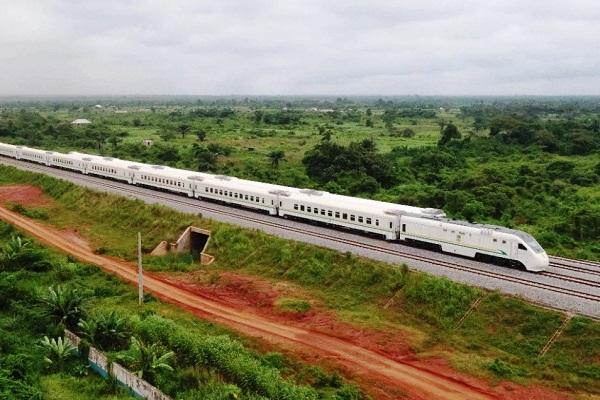With the Federal Government’s legacy Railway Modernisation project, among other infrastructure, largely financed by loans from China, the hopes of millions of Nigerians looking forward to the ease that the project would bring to livelihoods and its impact on the economy when completed, may be dashed.
Some of the experts expressed worry over the new stance by the Chinese government on loans for development of Nigeria’s infrastructure, saying the move will further impoverish the common man.
They argued that the move would not only add to the number of abandoned projects across the country, but would also aggravate socio-economic challenges such as unemployment and diminishing living standards confronting Nigerians.
Also, while speaking during the inspection of the Kaduna-Kano Standard Guage rail line, the minister said: “We are putting pressure on all the necessary institutions that used to give us funds. And hopefully, before May we will be able to get enough funds to complete this project.”
The Federal Government said about $318million had been paid to the contractors, China Civil Engineering Construction Company (CCECC), with the hope that by the time China finally approves the $1.2billion loan requested for the construction of the standard gauge line, the work would have reached an appreciable stage.
Stakeholders stressed that, on another hand, the stoppage of the loan may be as a result of the outcry by Nigerians amid fears that Nigeria may end up giving up its sovereignty to China due to loan terms and conditions perceived to be unsavoury.
Currently, only two railway projects have been completely financed by China. They are the Abuja-Kaduna standard gauge railway at the cost of $500million, and the Lagos-Ibadan at the cost of $2.5billion. The initial plan was for them to fund Lagos to Kano railway at the cost of $8.1billion.
The Chief Executive Officer, African Railway Round Table, Mr. Olawale Rasheed told us that although the minister Amaechi has good intentions for the railway subsector, the approach to building the railway was not in line with best practice and was unsustainable, adding that the Minister was not doing the right thing as regards the railway modernisation project.
According to him, the best approach is private sector involvement in the design, construction and operation of the railway.
Olawale noted that Egypt, Tanzania and Senegal have the most developed railway systems in Africa, which uses electric trains. He observed that the rail projects were not funded by the Chinese but private sector investors.
He said: “For instance, Brazilian government invited its private sector to identify the railway project they would want to invest in and today, there are about 41 ongoing railway projects in the country. So also in Tanzania, the government partnered with a financial institution to raise $1billion from the private sector to construct their railway.”
On his part, Chief Executive Officer of Bethlehem Rail and Chairman of Federal Government committee to unbundle the Nigeria Railway Corporation (NRC), Rowland Ataguba, said he is not surprised at the withdrawal of China from funding Nigeria railway projects as the country had been re-evaluating its approach to Africa and its engagements across the continent.
According to him, many of the loans China has been granting to the railway sector have been what you may call cheap (but ultimately expensive) or “political loans” as the loans lack sound business cases.
Ataguba, who is also the Chairman of the Technical Advisory Committee (TAC) on the Railway Bill and the National Transport Commission Bill in the House of Reps, while reacting to the government’s approach of the West for the credit facility, said Western conditions are more stringent and take more time to make shovel ready. He said loans from the West were, however, more durable for the African people and China would be better served by adopting similar criteria.
He added: “The West, who are no angels themselves, had gone to town accusing China of debt-trap diplomacy in Africa. But it was not until Sinosure, China’s state-owned insurer lost a whopping $1bn from underwriting the Djibouti-Addis Ababa railway and Tanzania’s then-incoming President Magafuli cancelled multi-billion dollar contracts awarded to Chinese contractors, that China realised it had a big problem on its hands.”
Ataguba noted that the impact on the economy could be significant as can be seen from the slowing down of the pace of business activities hitherto ascribed to the COVID-19 pandemic.
Olawale said government’s plan to approach European countries to fund railway projects may not yield much fruit as most of them are cash-shrunk due to the COVID-19 pandemic, saying the best bet is the private institutions like Siemens, the largest railway construction company in Germany, Coleman and several others.
Some economic experts attributed the development to both political and economic reasons. Director, Institute of Fiscal Studies (IFS), Godwin Ighedosa said that the Chinese government’s decision to stop further loans was informed by political and economic reasons.
He explained that China was aware that the country is edging towards an election year, hence they are being careful to grant more loans while watching what the next leadership will stand for. “It is only wise on their part to walk on the side of caution while evaluating their position as they look at the political environment,” he noted.
Professor Ajayi Omo-Ogun of the University of Calabar, Cross River State, said the option for Nigeria depends on the terms of the loans it has entered into in the first place.
“If the government have some specific clauses that allow it a source for loans from other countries to complete ongoing projects, that may be fine. If not, the country may be in mess. There is no doubt that some of these contract agreements are shrouded in questionable terms that may not augur well for the country,” he said.
He stated that where or when such access is denied or withdrawn, China losses the appetite for granting of these concessionary loans.
Chukwu, who is the Chief Executive Officer of Cowry Assets Management Limited, pointed out that it will be very difficult for Nigeria to access similar loans from western countries given the strict governance standard imposed by the European and American governments on bilateral and multilateral loans, which Nigeria at present is unlikely to meet.
“Unconfirmed report has it that China decided to stop further disbursement of loans granted to Nigeria after our country revoked the production sharing contract between NNPC and Addax Petroleum, a company acquired by China for the sole purpose of the contract it had with NNPC. So basically, China had their eye of juicy contracts involving crude oil lifting as a reward for the concessionary loans she has been extending to the Nigerian government.”
He insisted that options available to the federal government are very few, considering that they do not have the financial resources to continue with the execution of these projects.
ON options available in view of the development, the Federal Government may have started exploiting the possibility of tinkering with its memorandum of understanding with its Chinese partners to salvage the working relationship with them.
Sources close to the discussion said China is gradually losing confidence in the ability of the country to manage the projects efficiently and be able to offset the facilities extended to the country. A source said China is concerned about the rising debt profile of the country. Hence, they are reviewing their relationship.
Back home, China is currently prioritising its relationship. The country is struggling to rescue the economy blighted by Evergrande crisis. In the last quarter of last year, Chinese property developers faced $10.2 billion in offshore debt. The figure is almost double this quarter, analysts have said.
If China pulls the rug, Ife said there are options before Nigeria. But he is sure Nigeria can stem the tension caused by the crisis of confidence by changing the contract to build, operate and transfer (BOT) to build, own, operate and transfer (BOOT) to give the Chinese companies more stake in the projects.
“BOT and BOOT will give them more confidence that they will recover their money. That is what I feel will make a difference. In Mozambique and Zambia, they seized their seaport and airport for failing to honour their agreement. They took over those facilities to operate. Why wouldn’t you have a design abinitio that allows them to run the facilities for a period of time to recoup their investments?”
In the event that the government is unable to salvage the relationship with China, the government is open to exploring other sources. Already, the government is said to be in discussion with Standard Chartered Bank and other lenders for assistance. But another economist, Dr. Chiwuike Uba said what mattered was the conditionality of offers and economic viabilities of the projects involved.
He also called for proper cost and benefit analysis of the projects, noting that funding is the least if the associated issues are sorted out.
Source: Gurdian










